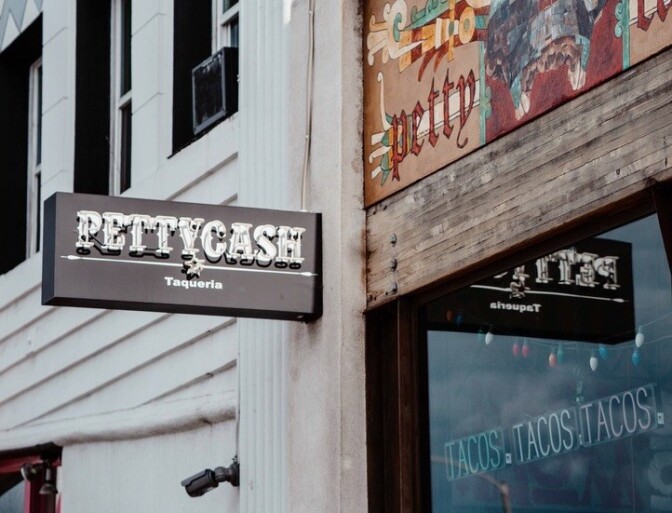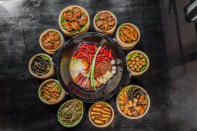On a Saturday afternoon at Milk Jar Cookies in Mid-Wilshire, Courtney Cowan tells customer after customer the same thing. She’s completely sold out.
“We opened at 10, so they started lining up around 9:15 or 9:30," she says. "We’re certainly serving everything we’ve got, trying to keep up with the beautiful demand."
Customers new and old have flocked to the shop to get one last taste of her delicious, signature dough. They’ve all heard the news: After 10 years, Cowan is reluctantly closing Milk Jar Cookies on Jan. 15.

“It’s been bittersweet, because a lot of old faces have come,” she says. “My hope when I opened was to be like the Cheers of cookies, where we know everybody’s name. We’ve done that.”
Milk Jar Cookies is a true labor of love. Back in 2012, Cowan left her job in television to pursue her cookie dream full time. She opened a second Encino location in 2022. But in December, she announced both shops will close due to untenable financial hurdles.
“We’ve been fighting for our life for about six months,” she says through tears. “Unfortunately, it just became a mountain too high for us to climb.”
Cowan’s experience echoes that of many L.A. restaurateurs in 2023. Between steep food and labor costs, lingering pandemic effects, and six months of Hollywood strikes, it's been a devastating year for the food business. A long list of establishments were forced to reduce their operations or close their doors permanently.

“When we’re busier than ever and we’re still overdue on bills … it just wasn’t enough,” Cowan says. “We’re just being squeezed from all sides.”
Pandemic pressure
Nearly four years ago, the world’s introduction to COVID-19 irreversibly changed the restaurant industry. Without the option of on-site dining, consumers moved toward carry out and delivery — shuttering countless restaurants.
Many of those that stayed afloat did so with the help of government relief programs that have now dried up, like Paycheck Protection Program loans and the Restaurant Revitalization Fund.

Those were crucial for seasoned chefs Walter Manzke and Margarita Manzke to keep their signature restaurant, République, open throughout the pandemic.
Unfortunately, the opposite happened at two of their other businesses: Petty Cash Taqueria shut its doors in October, and Sari Sari Store followed in December.
“Financially, they just couldn’t take the hit. There was just not enough volume going in there where it made sense to continue on,” Walter Manzke says.

Sari Sari Store — which built its home in Grand Central Market — relied on the steady flow of downtown L.A. office workers. Manzke says that’s completely changed with hybrid work. Offices just aren’t as bustling as they were in 2019.
Almost 75% of restaurant traffic today remains “off premises,” according to the National Restaurant Association. Before March 2020, it was closer to 61% — meaning people are more reliant on their takeout options than they were pre-pandemic.
"People are always looking at that shiny next object, and it’s very difficult for a restaurant to keep up with that."
On top of that, Southern California consumers are far less brand loyal compared to previous decades, according to San Diego-based restaurant consultant Ben Brown.
“People are always looking at that shiny next object, and it’s very difficult for a restaurant to keep up with that,” he says.
He also points to a boom in competition right after pandemic closures were lifted, which may have backfired for the industry.
“A lot of groups wanted to bring a new dining experience to the world once the world reopened. It seems that the market wasn’t really there to support all those new concepts.”
Rising costs
Los Angeles is expensive. Running a restaurant here isn’t cheap — or easy. Food service is a notoriously low-margin business within a competitive market, says Brown.
The traditional restaurant model splits things 30/30/30/10: 30% of revenue toward labor, 30% toward food and beverage, 30% toward fixed costs like rent and utilities, and 10% (at best) left over in profit.
Nowadays, rising costs of rent, food, and labor are distorting that breakdown.
“What you’re seeing is restaurants getting squeezed on all levels for that 10% to dissipate, and for a restaurant to be lucky to turn a profit whatsoever,” says Brown.
The rising cost of food is a top concern for operators nationwide. In Los Angeles, 65% of restauranteurs reported that all or most of their vendors increased prices in the past year, according to data by restaurant management system TouchBistro.
Labor is also pricey. California offered one of the highest minimum wages in 2024, at $16 — up from $15.50 last year. Under Assembly Bill 1228, hourly wages at large fast food chains will increase to $20 starting in April. Small business owners hiring from the same pool of workers say they can’t compete.
“Of course, people need to have a living wage. There's no question about it. The problem is: how do you operate a business successfully in order to accommodate the rising cost of labor, when your customer is not willing to pay the price premium that comes with that?”

Bar Moruno
In November, chef Chris Feldmeier made the painful decision to close his beloved Bar Moruno, an upscale Spanish restaurant in Silver Lake.
“Even if you’re running the best restaurant … your labor is up to 40%. It’s really hard, there’s not a lot of profit or anything left over,” he says.
As a “kitchen guy,” Feldmeier is all for higher wages. But he says the restaurant industry as a whole hasn't been able to keep up. “We ran a fantastic food cost to try to mitigate some of these hourly wages and stuff, and we still had a tough go at it.”
Restaurateurs like Feldmeier haven't been going down without a fight. Cost-saving measures like mandatory service charges and smaller menus are more common. "Many of these operations have had to fundamentally re-engineer how they conduct business," says Hudson Riehle, senior vice president of research for the National Restaurant Association.
Menu prices are 10-25% higher than they were in 2022, according to the James Beard Foundation.

Over the years, Cowan raised her cookie prices from $3 to $4, and began selling supplemental items like snackable dough, ice cream, and merchandise. She still couldn’t keep up with steep rent increases and a utility bill now 50% higher each month, while still paying her staff a competitive wage.
“Every single facet of owning a business has become more expensive and more difficult,” she says.
Hollywood strikes
In this company town, small businesses struggled through last year’s dual strikes by writers and actors — even while supporting them.
Cowan offered discounts for both guilds, and passed out cookies on several picket lines. However, she says the stall hit some small business owners even harder than COVID.
“When all of the orders from that whole industry cease and evaporate for almost eight months, that makes a massive impact,” she says.
The California economy lost up to $7 billion from the strikes, according to estimates by Todd Holmes, professor of entertainment industry management at California State University, Northridge. He says restaurants saw a 20-40% loss in revenue.
“Normally, they might have three different deliveries they’re doing in a day to studio sets, and it went from three a day to maybe, one or two a week,” he says.
Milk Jar Cookies was among the places that counted on set deliveries and gifts for agents and managers, in addition to events that were canceled during the strikes. “Our whole town depends on that industry, whether it’s toy stores or doggy daycares or bakeries or restaurants,” says Cowan.
“I think that was a death blow to a lot of restaurants, including mine."
Bar Moruno’s business also suffered from the loss of industry clientele in Silver Lake. Chef Feldmeier likens the entertainment industry to Los Angeles’ “steel mill" — if it shuts down, everything shuts down.
“I think that was a death blow to a lot of restaurants, including mine."
Winter blues
December was especially flooded with closure announcements, from classic gems like Marco’s Italian Restaurant to The Federal Bar in North Hollywood.
That’s probably not a coincidence; winter is a notoriously difficult time for restaurant operators, according to restaurant consultant Brown.
“It’s colder out, and people dine out less. That said, if a restaurant is going to stay open during the winter, they’re typically going to want to stay open through the holidays.”
Many places depend on that holiday bump to get them through the rest of winter. January and February is when they’ll assess whether it was enough. That means more closures are likely over the next few months.
For Cowan’s Milk Jar Cookies, even the holiday rush — which they can usually count on — didn’t cut it this year. They didn’t get a single order from an entertainment industry company.
“It just wasn’t enough,” Cowan says. “With all the other steps we had taken, I was really hopeful that we could get on the road to recovery. It just became very obvious that it was a hill too steep.”
Closing up shop
In its final weeks, the energy inside Milk Jar Cookies resembles its bustling, pre-pandemic self, filled with “beautiful, blissful chaos,” as Cowan puts it.
Orders spit out of a kitchen printer as she greets dedicated customers with teary eyes and hugs, thanking them for years of patronage and heartfelt words. They jot notes in a guest book before saying goodbye.

Sallie Patrick — screenwriter and former co-worker from Cowan’s television days — walks into the shop, two kids in tow. Cowan gets emotional at the sight of her friend, who encouraged her to pursue her cookie dream in the first place.
“I’m so proud of her. It was so cool to show my kids an example of this woman who just decided to start this business, and was so successful at it,” Patrick says.
"On the best of days or the worst of days, you could come in and leave feeling a little better than when you came in."
For Cowan, it’s always been bigger than cookies. The outpouring of community support has reminded her that she’s not alone in that sentiment.
She's not sure what's next, but she's sure how she'll remember Milk Jar Cookies: “On the best of days or the worst of days, you could come in and leave feeling a little better than when you came in.”











